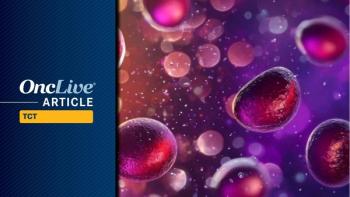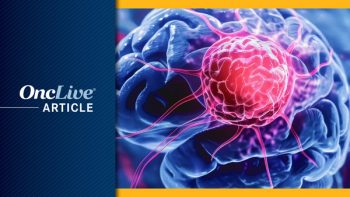
CAR T Cells and Lymphoma Adverse Events
Transcript:
Stephen J. Schuster, MD: Let’s discuss adverse events. Matt, you said everybody knows about steroids and toci [tocilizumab]. Does anyone in this group feel as though steroids are absolutely contraindicated in CAR [chimeric antigen receptor] T-cell therapy, which used to be the mantra that the immunologists told us? I remember the early days, where, if we put steroids onboard, it wasn’t going to work. And again, it wasn’t data-driven, but it was theoretical. What’s been the cumulative experience here with steroids to treat toxicities?
Matthew J. Frigault, MD: Loretta, I think [the University of Texas] MD Anderson [Cancer Center] had a retrospective review of steroids that was presented at ASCO [the American Society of Clinical Oncology annual meeting], was it?
Loretta J. Nastoupil, MD: Paolo Strati, [MD,] looked at it. Across the board, there’s been early introduction of steroids, and it does not seem to impact efficacy, at least in the short term. What Paolo looked at, again, retrospective single-center; he demonstrated that if you had high doses and a particularly prolonged course of steroids, that may have a negative impact on outcome. So again, everyone should be looking at strategies to mitigate toxicity, particularly if you can prevent them from going from grade 2 to grade 3 or higher. But you do need to be mindful of having these patients on high-dose steroids, particularly for prolonged periods.
David Miklos, MD: This reminded me of how we frequently discuss graft-versus-host disease [GVHD]. It’s 50 years into allotransplant, and we still argue about what is the definition of steroid-refractory acute GVHD, how do you best manage, what is the best way to taper? If anybody thinks there’s going to be a simple answer to the management of steroid CAR T, I want to take that out of your heads right now.
Matthew J. Frigault, MD:Unless you prevent the toxicity in the first place.
David Miklos, MD: I do think it’s a little bit easier, because there’s a starting point. And I do think that allogeneic products might give us the ability to look at more uniform products being put into different people and how they’re managed. But this will be the problem that we’re going to be trying to argue about for a long time, I suspect.
Stephen J. Schuster, MD: I’ll be retired by then, by the time it’s solved. But I’ll tell you that I think, Matt, it really is dose and duration. It’s not like steroids should be anathema if you’re getting CAR T cells. A short course of therapeutic for, I should say pharmacologic doses of steroids, I’ve never seen it affect outcome, and we’ve had to do it for neurotoxicity and even CRS [cytokine release syndrome]…. But yes, the same way it’s not very effective in killing the T cells that cause GVHD, it doesn’t really kill the CAR T cells that well either.
Matthew J. Frigault, MD: The counterarguments are that correlation of steroids and decreased long-term efficacy could be that you’re having to treat patients who have higher-risk disease that’s more inflammatory in the first place.
Stephen J. Schuster, MD: Yes, and there are data showing the sicker patients have worse outcomes. We used to think the sicker you got, the better the result was going to be. In the early days of this, I have to tell you, I had patients who didn’t get sick, who were going into remission. I was treating these patients as outpatients, and they’d come in and say, “Doctor, it didn’t work.” And I’d say, “How do you know it didn’t work. We didn’t do a scan.” They’d say, “Maybe I had some backache or a little—but I didn’t get sick.” And it’s like, no, you don’t have to get sick for this to work. Because ALL [acute lymphocytic leukemia] was the first disease treated, there was a folklore that developed. And honestly, I had patients who were disappointed they didn’t get sick. But in reality, the data suggest that those who get sick in the end may have worse outcome.
David Miklos, MD: There’s a toxicity, though, that none of us gave enough credibility to up front. And I want to hear your opinion, Steve, with the experience of [tocilizumab]. But in the axi-cel [axicabtagene ciloleucel], the cytopenias that are developing in patients, beginning usually 3 weeks to 6 weeks initially, with neutropenia being a major problem with patients around day 28, 50% of whom are getting G-CFS [granulocyte colony-stimulating factor] support. And even looking out at a year now, in a study that I saw from Michael Jain, [MD, PhD,] in the Moffitt [Cancer Center] group, and we’re doing similar studies at Stanford [University], showing that at least 10% of the patients beyond a year of [axicabtagene ciloleucel] have intermittent neutropenia. So cytopenias remain a bit of a problem, which is especially a little scary to the community physicians because every time the patient has a fever, do they need to bring them in? This remains a question.
Stephen J. Schuster, MD: Yes. We keep focusing on things like CRS and neurotoxicity. In the real world, cytopenias are a problem. How long do you need to get platelet transfusions for and check blood counts constantly, and I guess the propensity to develop infections early on after this? And I think there are differences. There are probably going to turn out to be some differences between the products, and also between the type of lymphodepletion that you use. If you look at our prolonged cytopenias with the low-dose Cy/Flu [cyclophosphamide with fludarabine] that we use with tisagenlecleucel or bendamustine, it’s less than with the 900 [mg] cumulative for Cytoxan and 90 [mg] cumulative for fludarabine. That’s why I was so excited when I saw the abstract from ASCO 2020 where they were using pembrolizumab, not chemotherapy, prior to their T cells, and ended up with response rates that were like a complete remission [CR]. Yes, follow-up sure, but a 55% CR rate. Come on, it’s not bad.
Transcript Edited for Clarity






































